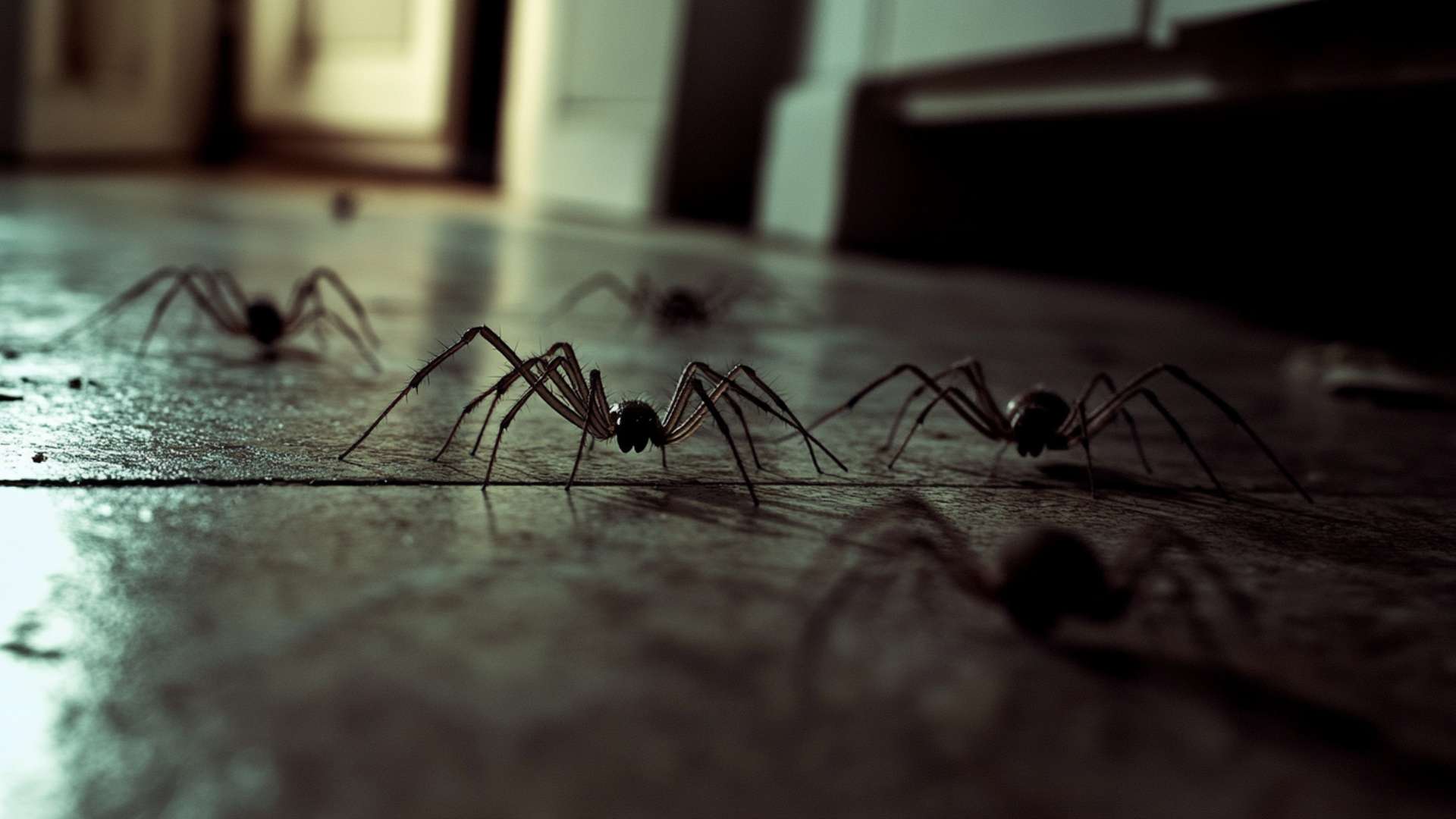Garages are notorious for being a haven for creepy crawlers, and spiders are no exception. It’s not uncommon to find these eight-legged creatures weaving their intricate webs in the corners or lurking behind boxes in our garages.
However, while some may find spiders fascinating, many of us prefer to keep them out of our personal spaces. In this comprehensive guide on how to keep spiders out of your garage, we will explore effective strategies that prioritize cleanliness and safety.
Brief Overview of the Common Problem of Spiders Infesting Garages

Spiders have an uncanny ability to squeeze through even the tiniest cracks and crevices, making our garages an ideal habitat for them. Their presence can become a nuisance as they spin their intricate webs across door frames, window screens, and any other available surface. Not only do these webs create an unsightly mess, but they also serve as a constant reminder that you’re sharing your space with these uninvited guests.
Furthermore, garage spiders reproduce quickly and can establish large populations if left unchecked. This means encountering spider poop or running into their sticky traps becomes a regular occurrence.
The presence of spiders also attracts other pests into the garage since they serve as a readily available food supply. To prevent this from happening, taking proactive steps to eliminate spiders from your garage is essential.
Importance of Keeping Spiders Out for Cleanliness and Safety Reasons
Keeping your garage spider-free goes beyond cosmetic reasons; it’s crucial for maintaining cleanliness and ensuring overall safety within your space. Spider webs tend to accumulate dust and debris over time, creating an unsanitary environment that nobody wants in their home extension. Moreover, certain species like wolf spiders possess venomous bites that can cause allergic reactions in some individuals or painful discomfort at the very least.
By actively adopting preventive measures to repel spiders from your garage, you significantly reduce the chance of encountering these unwanted spider bites or dealing with any other potential hazards spiders may pose. In addition, many people store valuable items in their garages, such as vehicles, tools, or sentimental belongings.
These items can be damaged or compromised by spider webs and the debris they collect. By discouraging spiders from taking up residence in your garage, you are protecting your possessions and ensuring they remain in top condition.
Remember, you deserve a clean and safe environment for all your garage-related activities. In the following sections, we will delve into specific strategies that will help keep those eight-legged creatures at bay.
Understanding Spiders
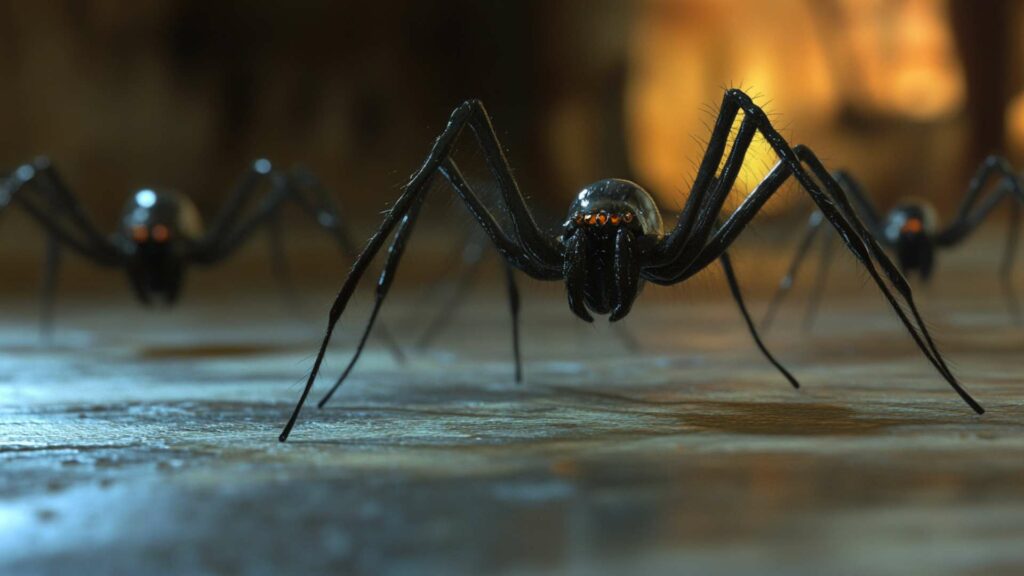
General characteristics and habits of spiders
Spiders, with their eight legs and intricate webs, are fascinating creatures that play a vital role in the ecosystem. Understanding their general characteristics and habits can help us better deal with the spider problem in our garages. Firstly, spiders are arachnids, not insects, belonging to the class Arachnida.
They have two main body parts: the cephalothorax and abdomen. Most spiders have fangs through which they inject venom into their prey to immobilize or kill it.
As for their habits, spiders are known for being nocturnal hunters. They prefer dark corners or hidden areas where they can spin their webs undisturbed.
These silk structures allow them to catch other bugs as a source of food supply. Spiders are also territorial creatures that tend to stay in one place unless forced to move due to environmental factors or lack of food.
Different spider species commonly found in garages
When it comes to dealing with spiders found in garages, it’s essential to know which species you might encounter. The most common spider species infesting garages include wolf spiders, cellar spiders (also known as daddy longlegs), orb-weaver spiders, and black widow spiders.
Wolf spiders are often large and hairy-legged predators that do not build webs but actively hunt down other insects. Cellar/daddy longlegs spiders create irregular webs typically found in corners or beneath objects within the garage space.
Orb-weaver spiders craft intricate circular webs that serve as traps for flying insects like mosquitoes and flies—they tend to attract bugs and be less aggressive towards humans. Black widow spiders are venomous arachnids recognizable by their red hourglass-shaped markings on the underside of their abdomen.
Although house spiders and black widows rarely bite humans unless provoked or threatened directly, caution is advised when encountering them in the garage. Identifying these spider species can help homeowners take appropriate measures to prevent spiders from establishing a presence in their garages.
By understanding the general characteristics and habits of spiders, as well as familiarizing ourselves with the common spider species found in garages, we can take informed steps to deter and eliminate spiders effectively. Let’s move on to the next section where we will discuss identifying potential entry points for spiders in our garages.
Identifying Potential Spider Entry Points in the Garage
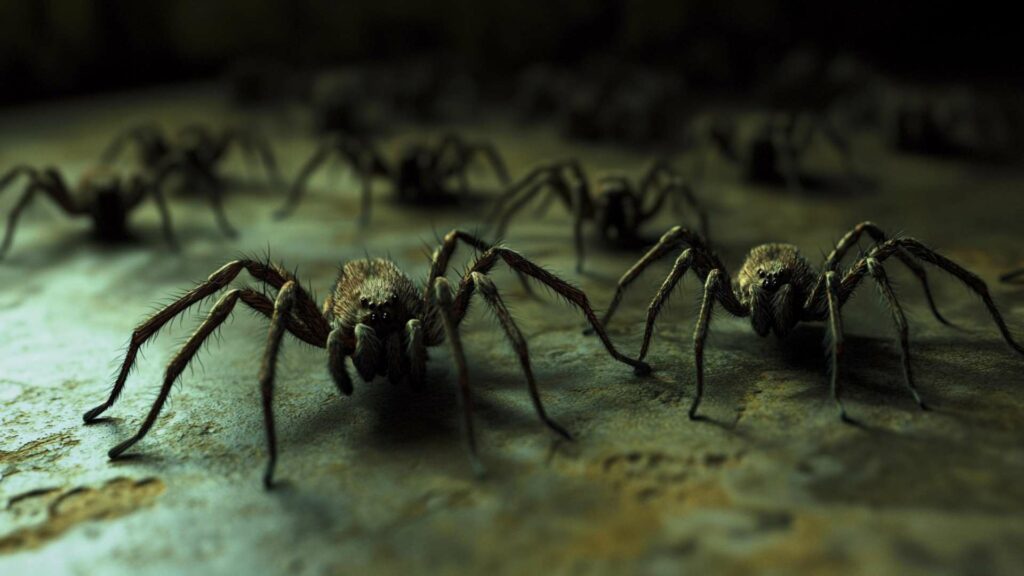
Inspecting garage doors, windows, and screens for gaps or damage
When it comes to keeping spiders out of your garage, one of the first areas to inspect is the entrance points – namely, the garage doors, windows, and screens. Spiders are adept at squeezing through even tiny gaps or cracks, so it’s crucial to pay attention to any signs of damage.
Start by examining the edges of your garage doors for any visible gaps or holes that may have developed over time. Ensure that weatherstripping is intact and properly installed around the edges of both overhead doors and side entry doors.
If you notice any tears or loose sections in your window screens, promptly repair them using a patch kit or replace them altogether. Remember that even a small tear can be an open invitation for pesky spiders!
Checking for cracks or holes in walls, floors, and ceilings
Spiders have a knack for finding their way into garages through minuscule openings in walls, floors, and ceilings. Take some time to thoroughly inspect these areas for any cracks or holes that might serve as spider entry points. Use a flashlight to examine both interior and exterior walls for signs of damage such as gaps around electrical outlets or utility access points.
Check the walls near floor level as well since spiders often crawl along there seeking dark corners to build their webs undisturbed. Don’t forget about the ceiling either – scan it carefully for any visible cracks that may need sealing.
Examining utility lines and pipes entering the garage
Another potential gateway for spiders into your garage is through utility lines and pipes that enter the area from outside. Inspect these connections closely to identify any openings where creepy crawlers could sneak in unnoticed.
Look out for gaps around electrical conduits or plumbing lines where they enter the garage. If you find any, seal them up with caulk or expandable foam insulation.
Remember, spiders are opportunistic creatures and will exploit any available entry point to access your garage and make it their new home. By thoroughly inspecting your garage doors, windows, screens, walls, floors, ceilings, and utility connections for gaps or damage, you can effectively identify the potential entry points for spiders.
Taking these proactive measures will help prevent spiders from infiltrating your garage and setting up shop. Remember that a meticulous inspection is the first step on your journey to spider control in this often overlooked space of our homes!
Sealing Off Spider Entry Points
Repairing damaged screens, windows, and doors with weatherstripping or caulk
One of the first steps in keeping spiders out of your garage is to ensure that the entry points are properly sealed. Inspect all screens, windows, and doors for any gaps or damage. Spiders can easily squeeze through even the tiniest openings, so it’s essential to fix any holes or tears you find.
Repair damaged screens by patching them up with a screen repair kit or replacing them entirely if needed. For windows and doors, use weatherstripping to seal off any gaps around the edges.
Apply caulk to fill in larger cracks or openings that may have developed over time. By taking these measures, you create a barrier that makes it much harder for spiders to enter your garage.
Filling cracks and holes using sealants or expanding foam insulation
In addition to repairing screens, windows, and doors, it’s important to inspect the walls, floors, and ceilings for any cracks or holes that could serve as entry points for spiders. These sneaky arachnids can find their way into even the tiniest crevices!
To block their path effectively, use sealants such as silicone caulk to fill in small cracks or gaps along surfaces. If you come across larger openings like holes created by cables or pipes entering your garage space, consider using expanding foam insulation as it expands to fit irregular shapes while providing an effective barrier against unwanted creepy crawlies.
Installing door sweeps to prevent spiders from crawling under garage doors
A common area where spiders can easily gain access is underneath your garage door. To deter these eight-legged intruders from sneaking in this way, installing door sweeps is highly recommended.
Door sweeps are flexible attachments that are mounted at the bottom of the garage door, creating a seal to prevent spiders from crawling under. Ensure that the door sweep is properly installed and touches the ground when the door is closed, leaving no gaps for spiders to squeeze through.
This simple yet effective measure can significantly reduce spider intrusion and keep your garage space spider-free. By sealing off spider entry points with weatherstripping, caulk, and proper insulation, you create a formidable barrier against these unwanted house guests.
Repairing damaged screens, windows, and doors prevents sneaky spiders from entering through vulnerable areas. Filling cracks and holes using sealants or expanding foam insulation ensures that there are no hidden access points left unaddressed.
Installing door sweeps provides an additional layer of protection by blocking spiders from crawling under your garage door. By implementing these measures together with other strategies discussed in this article, you can create a spider-proof environment in your garage and bid farewell to those creepy crawlers once and for all!
Decluttering and Organizing the Garage Space
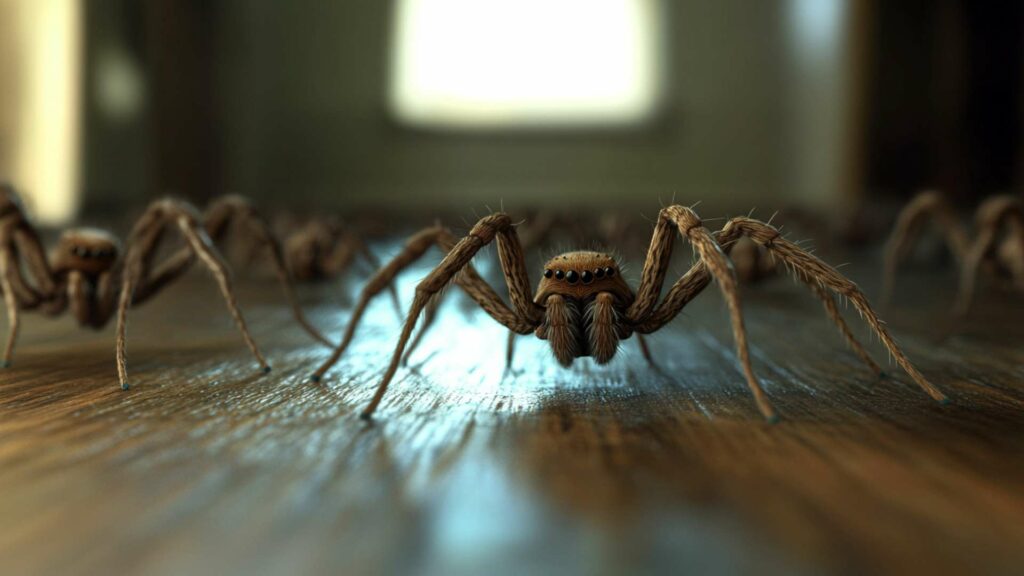
Removing Unnecessary Items that Serve as Hiding Spots for Spiders
Clearing the Cobwebs of Clutter When it comes to keeping spiders out of your garage, decluttering and organizing the space is a crucial step.
Spiders are masters of hiding, and they thrive in areas with ample hiding spots. Therefore, you must remove any unnecessary items that can serve as cozy spider sanctuaries.
Start by clearing out those old boxes that have been sitting untouched for years, along with piles of debris or unused items taking up valuable space. Not only will this help prevent spider infestation, but it will also create a more organized and functional garage environment.
Properly Storing Belongings in Sealed Containers or on Elevated Shelves
Out of Sight, Out of Spider’s Reach, Once you’ve cleared out the clutter from your garage, it’s essential to properly store your belongings in sealed containers or on elevated shelves. This ensures that spiders won’t find their way into cardboard boxes or other storage containers and make them their new home.
Sealed plastic containers are particularly effective at keeping spiders at bay since they provide an extra layer of protection against creepy crawlies. Additionally, consider using elevated shelves to store your items.
Spiders prefer low-lying areas where they can easily hide, so keep things off the ground whenever possible. By taking these simple steps to eliminate potential hiding spots for spiders within your garage through decluttering and proper storage techniques, you significantly reduce their chances and get rid of spiders setting up camp amidst your belongings.
Remember—spiders love darkness and secluded spaces. By removing clutter and storing items properly sealed away from their reach, you’ll discourage them from making themselves at home in your garage sanctuary.
Regular Cleaning Practices to Deter Spiders
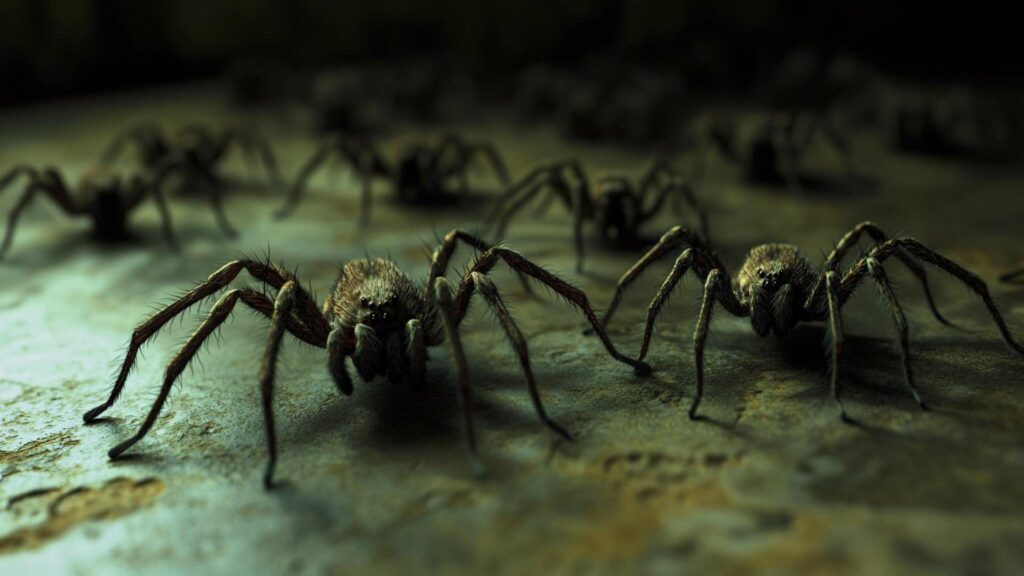
Keeping your garage spider-free with simple cleaning routines Regular cleaning practices are essential in maintaining a spider-free environment in your garage.
By consistently clearing away cobwebs, vacuuming hard-to-reach areas, and sweeping the floor, you can significantly reduce the presence of spiders. These cleaning tasks not only eliminate existing webs but also remove potential hiding spots and food sources for these eight-legged intruders.
Clearing away cobwebs regularly using a long-handled broom
One of the most effective ways to deter spiders in your garage is by regularly clearing away cobwebs using a long-handled broom or duster. Begin by inspecting corners, ceilings, and other crevices where spiders tend to build their webs.
Gently sweep away any visible cobwebs, making sure to reach high and low areas that are often overlooked. By removing these intricate structures to discourage spiders, you disrupt the spider’s habitat and discourage them from returning.
Vacuuming corners, ceilings, and other hard-to-reach areas
Vacuuming is an excellent complement to clearing cobwebs as it allows you to target those pesky spiders hiding in corners or clinging onto ceilings. Use an extension wand or nozzle attachment on your vacuum cleaner to reach high spots. Pay particular attention to cracks in walls or door frames where spiders may seek refuge.
To maximize effectiveness, consider attaching a fine-meshed screen over the nozzle attachment as it prevents sucked-up spiders from escaping back into your garage. Remember that regular vacuuming not only removes spiders but also eliminates any leftover insects that may serve as food sources for them.
Sweeping the garage floor frequently to remove spider webs
Spider webs can often be found near the floor, so sweeping it frequently is crucial in preventing spiders from establishing a presence in your garage. Use a broom with stiff bristles to sweep along walls, corners, and under shelves or workbenches.
Pay close attention to areas where dust and debris tend to accumulate, as they attract spiders that may use these materials as building blocks for their webs. Additionally, make sure to remove any dead insects or spiders you encounter during the cleaning process.
This not only eliminates potential food sources for other spiders but also discourages them from returning. By incorporating regular sweeping into your cleaning routine, you’ll significantly reduce spider activity in your garage.
Utilizing Natural Spider Repellents
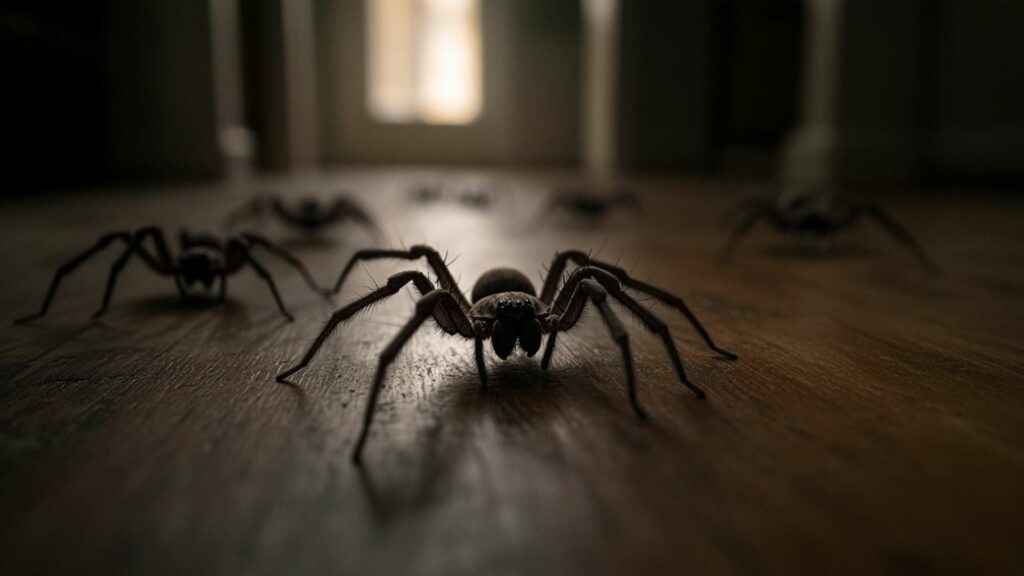
Planting spider-repellent herbs like lavender or mint near entrances
One effective and natural way to deter spiders from entering your garage is to strategically plant spider-repellent herbs such as lavender or mint near the entrances. Spiders have a strong aversion to these aromatic plants, making them less likely to venture into your garage. The delightful fragrance of lavender or mint can also serve as a pleasant addition to your garage environment.
You can plant them in pots or create a small herb garden close to the doors and windows of your garage. Not only will this enhance the appearance of your entrance but also help keep those eight-legged intruders at bay.
Placing citrus peels or vinegar-soaked cotton balls around the garage
Citrus peels, with their potent scent, can act as a natural deterrent for spiders. Instead of throwing away those orange, lemon, or lime peels after enjoying the juicy fruit, repurpose them! Simply place the citrus peels in areas where you suspect spider activity in your garage.
Spiders dislike the strong odor emitted by citrus fruits and will try to avoid it. Alternatively, you can soak cotton balls in white vinegar and strategically place them around your garage.
The pungent smell of vinegar acts as a powerful repellent for spiders. Refresh these spider deterrents periodically by replacing old peels or adding more vinegar to ensure their effectiveness.
Spraying diluted essential oils
Another effective way to deter spiders naturally is by spraying diluted essential oils known for their repelling properties. Peppermint essential oil, and tea tree oil are two popular options that spiders find offensive due to their strong scent.
To make a spider-repellent spray, mix 10-15 drops of either oil with water in a spray bottle. Once prepared, generously spritz the mixture in areas where spiders are likely to build their webs, such as dark corners, along the garage walls, and behind cardboard boxes.
Remember to reapply the spray every couple of weeks or after heavy rainfalls to maintain its potency. Not only will this method help in keeping spiders away but it’ll also leave your garage smelling fresh and invigorating.
Conclusion
Incorporating natural alternatives like spider-repellent herbs, citrus peels, and essential oils into your spider prevention strategy can make a significant difference in deterring spiders from infesting your garage. By planting lavender or mint near entrances, placing citrus peels or vinegar-soaked cotton balls strategically around the space, and spraying diluted essential oils with repelling properties, you can create an unfavorable environment for these unwanted arachnids.
Remember, keeping a clean and organized garage also plays a crucial role in reducing a spider’s food supply and hiding spots. Regularly clear out clutter and utilize proper storage solutions to minimize potential habitats for spiders.
By implementing these techniques consistently, you can take control of your garage space and bid farewell to those eight-legged intruders. So say goodbye to spider webs clinging in the corners of your garage; with these natural repellents at your disposal, you can confidently reclaim your space from unwanted arachnid visitors!
Conquer Arachnid Issues with D-Termination: Las Vegas’ Top Pest Control Choice!

If the presence of spiders on your Las Vegas property is causing concern, look no further than D-Termination for the solution. Our skilled team excels at eradicating spider infestations, bringing back serenity and calm to your space. Bid farewell to spiders—opt for D-Termination’s effective pest control today!
Reach out to us at 702-919-6310 or visit dtermination.com to schedule your spider control service and reclaim your space from these unwelcome pests.
Frequently Asked Questions:
Cedar blocks or essential oil sprays can deter spiders in garages.
Spiders often enter garages in search of shelter or prey.
Regular cleaning, removing clutter, and sealing cracks help keep spiders away.
Spiders often dislike strong scents like citrus, vinegar, or peppermint.

